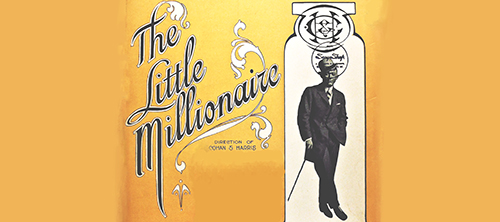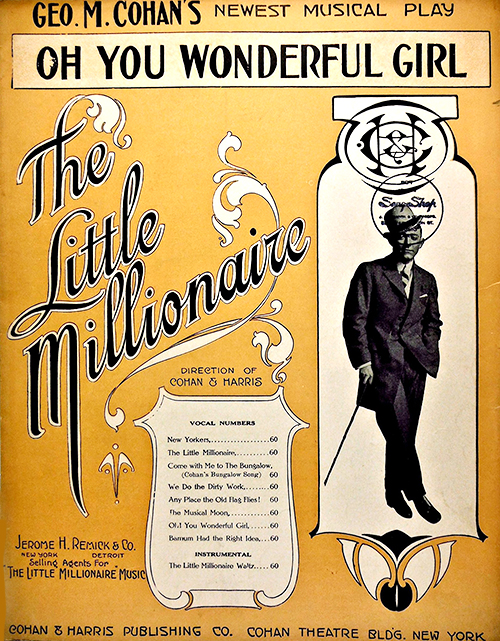Little Millionaire (The)
Musical (1911) - Top

Cela faisait plus de trois ans, depuis "The Yankee Prince" que George M. Cohan n'avait plus présenté une vraire création totale de musical à Broadway. Il n'avait bien sûr pas été absent mais avait plutôt proposé des musicals qui étaient des adaptations d'œuvres littéraires (Get-Rich-Quick Wallingford) ou de ses propres pièces à lui (The Man Who Owns Broadway d'après son Popularity), des revues ou des reprises. Et il avait produit des spectacles d'autres artistes. Ici, Cohan va aussi inenter l'histoire. Pour cette nouvelle création à 100%, Cohan était comme d’habitude multi-casquettes: il était la star sur scène, le librettiste, le parolier, le compositeur, le metteur en scène et le coproducteur. Et, comme d’habitude, le spectacle était une affaire de famille, et donc en plus de George M., la distribution comprenait son père, Jerry J. Cohan, sa mère, Helen F. aka Nellie Cohan, et sa cousine Lila Rhodes. Ce n'est plus les "Four Cohans", il manque sa sœur, mais quand-même! Le musical a reçu majoritairment des critiques élogieuses, a approché les 200 représentations à Broadway avant de s’embarquer dans un long US Tour.
C’est le dernier musical dans lequel Jerry et Helen Cohan ont joué.
Le jeune Robert Spooner (Le Petit Millionnaire) tombe amoureux d’une choriste nommée Goldie Gray. Son amour pour elle est tel qu’il est prêt à risquer toute sa fortune pour l’épouser (il est stipulé dans le testament de sa mère que lui et son père doivent approuver la femme qu'il désire épouser s'il veut hériter de la fortune de famille). De plus, un de ses amis de guindailles, Bill Costigan, refuse de quitter la maison de Robert sans l'avoir convaincu de mettre fin à ses fiançailles. En fait, Bill sait tout sur le mariage car il paie 1000 $ par mois de pension alimentaire à son ex-épouse.
Le père de Robert, Henry, rentre inopinément de ses vacances en Europe avec de grandes nouvelles: lui aussi a l’intention de se marier! Cela crée un tourbillon de confusion parce qu’il a l’intention d’épouser l’ex-femme de Costigan. Avec toutes ces rumeurs de mariages dans la maison, Roscoe et la bonne projettent de saccager dans le manoir tout ce qui a de la valeur et de faire disparaitre tout l'argent, en signe de protestation contre les mariages. L’ex-femme de Costigan et la tante de Goldie Gates (Mme Prescott) sont des ennemies mutuelles et la raison du divorce de Costigan. En fin de compte, tout est réglé quand Robert épouse Goldie, quand Costigan se réconcilie avec son ex-femme et quand Henry épouse Mme Prescott. Roscoe et la bonne sont appréhendés par la police, et le père et le fils peuvent garder leur fortune.
1) Souvenir de Cohan: "Un type est venu me parler pendant les répétitions du premier acte et m’a dit: « Qu’est-ce que je vais porter au deuxième acte? » J’avais une réponse pour lui. Je lu ai dit : «Je ne sais pas, mais si vous me disiez ce que vous aimeriez porter, vous pourriez peut-être me donner une idée pour un deuxième acte. Ensuite, j’ai essayé de lui expliquer que j’étais le genre de gars qui n’avait jamais commencé à écrire un deuxième acte avant que le premier acte ne soit en répétition depuis au moins une semaine.»
1 Little Millionaire (The) peut-être considéré comme un Top musical
Acte I
The New Yorkers
The Little Millionaire*
Come With Me To My Bungalow
We Do The Dirty Work
Charastic Waltz*
Drill Of The 7th
Anyplace The Old Flag Flies*
Acte II
No musical performances
Acte III
Musical Moon
Oh, You Wonderful Girl
Barnum Had The Right Idea*
The Dancing Wedding*
* indicates songs performed by Cohan
Aucun dossier informatif complémentaire concernant Little Millionaire (The)
Aucun dossier informatif complémentaire concernant Little Millionaire (The)

Version 1
Little Millionaire (The) (1911-09-George M. Cohan's Theatre-Broadway)
Type de série: OriginalThéâtre: George M. Cohan's Theatre (Broadway - Etats-Unis) Durée : 5 mois 2 semaines Nombre : 192 représentationsPremière Preview : 25 September 1911
Première: 25 September 1911
Dernière: 09 March 1912Mise en scène : George M. Cohan • James Corman • Chorégraphie : Producteur : George M. Cohan • Sam H. Harris • Star(s) : Avec: Maud Allen (Miss Primper), Earl Benham (Danny Wheeler), George M. Cohan (Robert Spooner), Helen F. Cohan (Mrs. Prescott), Jerry J. CohanDonald Crisp (Edward Plumber (Rudolph)), William Ford (Starter at the "Beaux Arts"), Sydney Jarvis (Roscoe Handover), Jack Klendon (Reverend H. Henry Dodge), Tom Lewis (Bill Costigan), Amy Mortimer (Mary), George Parsons (George Russell), Julia Ralph (Berdina Busby), Lila Rhodes (Goldie Gray), Dore Rogers (Policeman), Charles W. Weil (Page Boy), Josephine Whittell (Bertha Burnham)Presse : "Again George M. Cohan has dared and won. An inveterate perpetrator of dramatic tricks and surprises, in "The Little Millionaire" he has so far disdained the traditions of musical comedy as to present an entire act without a note of music or without a suggestion of the chorus-the old reliable life saver of so many a piece of its class. He has done more; he has, so far as opportunities go, made not himself but Tom Lewis the star. And what was still more daring, in the new piece he gives the best ballad, a serious love duet, to the two villains of the play. And as served to the audience at the Cohan last evening these startling innovations please, tickled and incited the audience to thunderous applause. No one but George Cohan would have dared these violations of the conventions and doubtless no one but Cohan would have made them acceptable." (Rennold Wolf, The Morning Telegraph)
"The success of such an entertainment as "The Little Millionaire" - and of course its success is no doubt - is due to the fact that Mr. Cohan knows his little book from the first page to the last and, as he might say, then some, maybe." (The New York Times)
"One must concede that George M. Cohan has talent. He has nimble legs, and he writes neat jingles of the popular kind. He also knows how to sing his ditties in a way that sends his numerous followers into ecstasies of admiration. This granted, Mr. Cohan has received about all the credit coming to him. No - we forgot - he is also a specialist in the art of rolling up his eyes and talking through his nose, talents which have earned for him the title "Yankee-doodle Comedian" (whatever that may mean), a distinction shrewdly helped along by the adoption of the United States flag as the trade mark of this particular actor.
All these peculiarities and characteristics have endeared George M. Cohan to his special public. For there is a Cohan public just as there is a John Drew public and a Maude Adams public, only it is not quite so select. The Cohanites are not exacting in their demands. They'll applaud anything, accept anything, so long as it bears the Cohan stamp. Plenty of noise, wild waving of the stars and stripes, a slim comedian full of impudent self-assurance, his eyes half clos ed, hopping about the stage, and they'll yell themselves hoarse. Otherwise, how explain the vogue of "The Little Millionaire," which some enthusiastic scribes have declared the best thing George has ever done? It is not. If Cohan's reputation rested on this piece, he would never have come to own his own theater on Broadway. It is the usual Cohan musical salad, only with a little less dressing than usual. To recount the plot were to waste the reader's time. It is hackneyed nonsense, with scenes thrown together in the crudest manner. The chorus is unattractive, and has little to do. Interest is lacking from the start, and the auditor yawns long before the end is reached. When the star himself holds the center of the stage the piece moves along. A human dynamo of nervous energy, Cohan keeps things hustling in his own characteristic style, but what of it? What does all the fooling, the stereotyped scenes and commonplace dialogue amount to if the play has, so to speak, not a leg to stand upon? The best part in the piece, that of the fat man who stumbles into everybody's way, is capitally acted by Tom Lewis, who has practically all the second act to himself. Lila Rhodes, a graceful and pleasing young lady, is Mr. Cohan's dancing partner." (Theater Magazine - November 1911)
Pas encore de video disponible pour ce spectacle